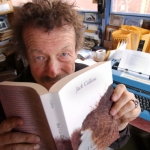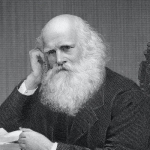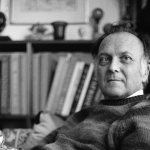Fresh Air by Kenneth Koch

I
At the Poem Society a black-haired man stands up to say
“You make me sick with all your talk about restraint and mature talent!
Haven’t you ever looked out the window at a painting by Matisse,
Or did you always stay in hotels where there were too many spiders crawling on your visages?
Did you ever glance inside a bottle of sparkling pop,
Or see a citizen split in two by the lightning?
I am afraid you have never smiled at the hibernation
Read Poem At the Poem Society a black-haired man stands up to say
“You make me sick with all your talk about restraint and mature talent!
Haven’t you ever looked out the window at a painting by Matisse,
Or did you always stay in hotels where there were too many spiders crawling on your visages?
Did you ever glance inside a bottle of sparkling pop,
Or see a citizen split in two by the lightning?
I am afraid you have never smiled at the hibernation
0
Incidents of Travel in Poetry by Frank Lima

Happy Birthday Kenneth Koch/Feb 27 We went to all those places where they restore sadness and joy
and call it art. We were piloted by Auden who became
Unbearably acrimonious when we dropped off Senghor into the
steamy skies of his beloved West Africa. The termites and ants
Read Poem and call it art. We were piloted by Auden who became
Unbearably acrimonious when we dropped off Senghor into the
steamy skies of his beloved West Africa. The termites and ants
0
Orfeo by Frank Lima

To my friends Each hair is a poem I gave my son
Each hair is my allowance from the universe
Read Poem Each hair is my allowance from the universe
0
Ars Poetica? by Czeslaw Milosz

I have always aspired to a more spacious form
that would be free from the claims of poetry or prose
and would let us understand each other without exposing
the author or reader to sublime agonies.
In the very essence of poetry there is something indecent:
a thing is brought forth which we didn’t know we had in us,
so we blink our eyes, as if a tiger had sprung out
and stood in the light, lashing his tail.
Read Poem that would be free from the claims of poetry or prose
and would let us understand each other without exposing
the author or reader to sublime agonies.
In the very essence of poetry there is something indecent:
a thing is brought forth which we didn’t know we had in us,
so we blink our eyes, as if a tiger had sprung out
and stood in the light, lashing his tail.
0
Kaddish by Allen Ginsberg

For Naomi Ginsberg, 1894—1956 I
Strange now to think of you, gone without corsets & eyes, while I walk on the sunny pavement of Greenwich Village.
Read Poem Strange now to think of you, gone without corsets & eyes, while I walk on the sunny pavement of Greenwich Village.
0
little report of the day by Jack Collom

9:13 p.m., Lucky Bock in hand,
I inscribe: walked the lovely
33 blocks to school today, streets clear and
thick melting snow all around.
taught my 4 hours of poetry; the afternoon
class was hard; kid named Schweikert
kept on fucking up. took typed-up
poems of yesterday to Platt and put up
Read Poem I inscribe: walked the lovely
33 blocks to school today, streets clear and
thick melting snow all around.
taught my 4 hours of poetry; the afternoon
class was hard; kid named Schweikert
kept on fucking up. took typed-up
poems of yesterday to Platt and put up
0
Poetry by Lydia Huntley Sigourney

Morn on her rosy couch awoke,
Enchantment led the hour,
And mirth and music drank the dews
That freshen’d Beauty’s flower,
Then from her bower of deep delight,
I heard a young girl sing,
‘Oh, speak no ill of poetry,
For ’tis a holy thing.’
Read Poem Enchantment led the hour,
And mirth and music drank the dews
That freshen’d Beauty’s flower,
Then from her bower of deep delight,
I heard a young girl sing,
‘Oh, speak no ill of poetry,
For ’tis a holy thing.’
0
Daffodils by Alicia Ostriker

—for David Lehman
Ten thousand saw I at a glance
Tossing their heads in sprightly dance.
—William Wordsworth
Going to hell so many times tears it
Which explains poetry.
—Jack Spicer
Read Poem Ten thousand saw I at a glance
Tossing their heads in sprightly dance.
—William Wordsworth
Going to hell so many times tears it
Which explains poetry.
—Jack Spicer
0
Letter to Gary Bottone by Jack Spicer

Dear Gary,
Somehow your letter was no surprise (and I think you knew that it was no surprise or you would have tried to break the news more gently); somehow I think we understand what the other is going to say long before we say it—a proof of love and, I think, a protection against misunderstanding. So I've been expecting this letter for five weeks now—and I still don't know how to answer it.
Bohemia is a dreadful, wonderful place. It is full of hideous people and beautiful poetry. It is a hell full of windows into heaven. It would be wrong of me to drag a person I love into such a place against his will. Unless you walk into it freely, and with open despairing eyes, you can't even see the windows. And yet I can't leave Bohemia myself to come to you—Bohemia is inside of me, in a sense is me, was the price I paid, the oath I signed to write poetry.
I think that someday you'll enter Bohemia—not for me (I'm not worth the price, no human being is), but for poetry—to see the windows and maybe blast a few yourself through the rocks of hell. I'll be there waiting for you, my arms open to receive you.
But let's have these letters go on, whether it be days, years, or never before I see you. We can still love each other although we cannot see each other. We will be no farther apart when I'm in Berkeley than we were when I was in Minneapolis. And we can continue to love each other, by letter, from alien worlds.
Love,
Jack
[c.1951-2]
Read Poem Somehow your letter was no surprise (and I think you knew that it was no surprise or you would have tried to break the news more gently); somehow I think we understand what the other is going to say long before we say it—a proof of love and, I think, a protection against misunderstanding. So I've been expecting this letter for five weeks now—and I still don't know how to answer it.
Bohemia is a dreadful, wonderful place. It is full of hideous people and beautiful poetry. It is a hell full of windows into heaven. It would be wrong of me to drag a person I love into such a place against his will. Unless you walk into it freely, and with open despairing eyes, you can't even see the windows. And yet I can't leave Bohemia myself to come to you—Bohemia is inside of me, in a sense is me, was the price I paid, the oath I signed to write poetry.
I think that someday you'll enter Bohemia—not for me (I'm not worth the price, no human being is), but for poetry—to see the windows and maybe blast a few yourself through the rocks of hell. I'll be there waiting for you, my arms open to receive you.
But let's have these letters go on, whether it be days, years, or never before I see you. We can still love each other although we cannot see each other. We will be no farther apart when I'm in Berkeley than we were when I was in Minneapolis. And we can continue to love each other, by letter, from alien worlds.
Love,
Jack
[c.1951-2]
0
Epistle to Dr. Arbuthnot by Alexander Pope

Neque sermonibus vulgi dederis te, nec in præmiis spem posueris rerum tuarum; suis te oportet illecebris ipsa virtus trahat ad verum decus. Quid de te alii loquantur, ipsi videant, sed loquentur tamen.
(Cicero, De Re Publica VI.23)
["... you will not any longer attend to the vulgar mob's gossip nor put your trust in human rewards for your deeds; virtue, through her own charms, should lead you to true glory. Let what others say about you be their concern; whatever it is, they will say it anyway."] Shut, shut the door, good John! fatigu'd, I said,
Tie up the knocker, say I'm sick, I'm dead.
The dog-star rages! nay 'tis past a doubt,
All Bedlam, or Parnassus, is let out:
Read Poem (Cicero, De Re Publica VI.23)
["... you will not any longer attend to the vulgar mob's gossip nor put your trust in human rewards for your deeds; virtue, through her own charms, should lead you to true glory. Let what others say about you be their concern; whatever it is, they will say it anyway."] Shut, shut the door, good John! fatigu'd, I said,
Tie up the knocker, say I'm sick, I'm dead.
The dog-star rages! nay 'tis past a doubt,
All Bedlam, or Parnassus, is let out:
0
The Unfrocked Governess by Peter Davison

(For Elizabeth Bishop)
Round of face, with dimpled chin and cheeks
framed by her plumage of white hair,
Read Poem Round of face, with dimpled chin and cheeks
framed by her plumage of white hair,
0
Erinna by Letitia Elizabeth Landon

Was she of spirit race, or was she one
Of earth's least earthly daughters, one to whom
A gift of loveliness and soul is given,
Only to make them wretched?There is an antique gem, on which her brow
Retains its graven beauty even now.
Her hair is braided, but one curl behind
Floats as enamour'd of the summer wind;
The rest is simple. Is she not too fair
Read Poem Of earth's least earthly daughters, one to whom
A gift of loveliness and soul is given,
Only to make them wretched?There is an antique gem, on which her brow
Retains its graven beauty even now.
Her hair is braided, but one curl behind
Floats as enamour'd of the summer wind;
The rest is simple. Is she not too fair
0
Berryman by W. S. Merwin

I will tell you what he told me
in the years just after the war
as we then called
the second world war
don't lose your arrogance yet he said
you can do that when you're older
lose it too soon and you may
merely replace it with vanity
Read Poem in the years just after the war
as we then called
the second world war
don't lose your arrogance yet he said
you can do that when you're older
lose it too soon and you may
merely replace it with vanity
0
Bean Spasms by Ted Berrigan

for George Schneeman New York’s lovely weather
hurts my forehead
Read Poem hurts my forehead
0
“I Broke the Spell That Held Me Long” by William Cullen Bryant

I broke the spell that held me long,
The dear, dear witchery of song.
I said, the poet’s idle lore
Shall waste my prime of years no more,
For Poetry, though heavenly born,
Consorts with poverty and scorn.
I broke the spell–nor deemed its power
Could fetter me another hour.
Ah, thoughtless! how could I forget
Its causes were around me yet?
For wheresoe’er I looked, the while,
Was Nature’s everlasting smile.
Still came and lingered on my sight
Read Poem The dear, dear witchery of song.
I said, the poet’s idle lore
Shall waste my prime of years no more,
For Poetry, though heavenly born,
Consorts with poverty and scorn.
I broke the spell–nor deemed its power
Could fetter me another hour.
Ah, thoughtless! how could I forget
Its causes were around me yet?
For wheresoe’er I looked, the while,
Was Nature’s everlasting smile.
Still came and lingered on my sight
0
Power by Audre Lorde

The difference between poetry and rhetoric
is being ready to kill
yourself
instead of your children.
I am trapped on a desert of raw gunshot wounds
and a dead child dragging his shattered black
face off the edge of my sleep
blood from his punctured cheeks and shoulders
Read Poem is being ready to kill
yourself
instead of your children.
I am trapped on a desert of raw gunshot wounds
and a dead child dragging his shattered black
face off the edge of my sleep
blood from his punctured cheeks and shoulders
0
A Perfect Market by Clive James

ou plutôt les chanter
Recite your lines aloud, Ronsard advised,
Or, even better, sing them. Common speech
Held all the rhythmic measures that he prized
In poetry. He had much more to teach,
Read Poem Recite your lines aloud, Ronsard advised,
Or, even better, sing them. Common speech
Held all the rhythmic measures that he prized
In poetry. He had much more to teach,
0
On the Grasshopper and Cricket by John Keats

The Poetry of earth is never dead:
When all the birds are faint with the hot sun,
And hide in cooling trees, a voice will run
From hedge to hedge about the new-mown mead;
That is the Grasshopper’s—he takes the lead
In summer luxury,—he has never done
With his delights; for when tired out with fun
He rests at ease beneath some pleasant weed.
The poetry of earth is ceasing never:
On a lone winter evening, when the frost
Has wrought a silence, from the stove there shrills
The Cricket’s song, in warmth increasing ever,
And seems to one in drowsiness half lost,
The Grasshopper’s among some grassy hills.
Read Poem When all the birds are faint with the hot sun,
And hide in cooling trees, a voice will run
From hedge to hedge about the new-mown mead;
That is the Grasshopper’s—he takes the lead
In summer luxury,—he has never done
With his delights; for when tired out with fun
He rests at ease beneath some pleasant weed.
The poetry of earth is ceasing never:
On a lone winter evening, when the frost
Has wrought a silence, from the stove there shrills
The Cricket’s song, in warmth increasing ever,
And seems to one in drowsiness half lost,
The Grasshopper’s among some grassy hills.
0
Structure of Rime XXVIII: In Memoriam Wallace Stevens by Robert Duncan

“That God is colouring Newton doth shew”—William Blake Erecting beyond the boundaries of all government his grand Station and Customs, I find what I have made there a Gate, a staking out of his art in Inconsequence. I have in mind a poetry that will frame the willingness of the heart and deliver it over to the arrest of Time, a sentence as if there could stand some solidity most spacial in its intent against the drifts and appearances that arise and fall away in time from the crude events of physical space. The Mind alone holds the consequence of the erection to be true, so that Desire and Imagination usurp the place of the Invisible Throne.
It is an angel then, weeping and yet ever attending the betrayal of the Word I mean to come to in the end. For my sake, the blood must be somewhere in time and in its own naming of place actual, and death must be as my own awaits me immediate to undo from its reality the physical body, all there is of the matter of me that is mine from me. The would-be dialecticians—Inquisitors of the New Dispensation in Poetry and Historians of Opprobrium, the Realists and Materialists—come forward to hold the party line against his ideality. There are too many listeners. There are too many voices in the one line. They must enter the Ideal to do so, for he has changed his mind, as if the Eternal existed only momentarily and went out with him. The Chairman of the Politbureau gets his number and moves to isolate his heresy. The number is no longer the same. He has gone back into the exchange of numbers. The phone continues ringing in the pattern of the message they strive to listen to report to the Bureau of Poetic Numbers and Approved Measures.
Read Poem It is an angel then, weeping and yet ever attending the betrayal of the Word I mean to come to in the end. For my sake, the blood must be somewhere in time and in its own naming of place actual, and death must be as my own awaits me immediate to undo from its reality the physical body, all there is of the matter of me that is mine from me. The would-be dialecticians—Inquisitors of the New Dispensation in Poetry and Historians of Opprobrium, the Realists and Materialists—come forward to hold the party line against his ideality. There are too many listeners. There are too many voices in the one line. They must enter the Ideal to do so, for he has changed his mind, as if the Eternal existed only momentarily and went out with him. The Chairman of the Politbureau gets his number and moves to isolate his heresy. The number is no longer the same. He has gone back into the exchange of numbers. The phone continues ringing in the pattern of the message they strive to listen to report to the Bureau of Poetic Numbers and Approved Measures.
0
About My Very Tortured Friend, Peter by Charles Bukowski

he lives in a house with a swimming pool
and says the job is
killing him.
he is 27. I am 44. I can’t seem to
get rid of
him. his novels keep coming
back. “what do you expect me to do?” he screams
“go to New York and pump the hands of the
Read Poem and says the job is
killing him.
he is 27. I am 44. I can’t seem to
get rid of
him. his novels keep coming
back. “what do you expect me to do?” he screams
“go to New York and pump the hands of the
0